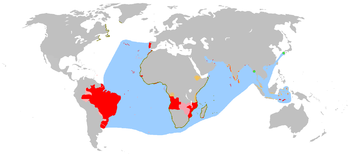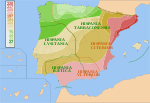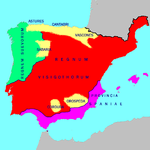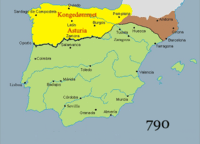- Military history of Portugal
-
History of Portugal 
This article is part of a seriesPrehistoric Iberia Early history Lusitania and Gallaecia 711–1139 Kingdom of Portugal 1139–1279 1279–1415 1415–1578 1578–1777 1777–1834 1834–1910 Portuguese Republic 1910–1926 1926–1933 1933–1974 1974–present Topic Colonial history Art history Economic history History of the Azores History of Madeira Language history Military history Music history Women's history
Portugal Portal
The Military history of Portugal is as long as the history of the country, either before the emergence of the socio-political reality of an independent Portuguese state, either after that.
Before Portugal
Before the emergence of Portugal, between the 9th and the 12th centuries, its territory was part of important military conflicts - these were mainly the result of three processes.
Roman Expansion
- The conflict between Ancient Rome and Carthage for the dominion of the western Mediterranean sea, mainly occurred in Iberia (the Roman Hispania) during the Second Punic War from 218 to 201 BC.
- The Roman conquest of Hispania, a long process from 218 BC (in the context of the Second Punic War) to 17 BC (already during Emperor Augustus), that had three major confrontations regarding modern Portuguese territory:
- The Lusitanian War from 155 to 139 BC, between the Romans and the Lusitanians, namely during the period these were led by Viriathus.
- The expedition and conquest of Gallaecia (north of Portugal and Galicia), from 135 and 132 BC, led by Consul Decimus Junius Brutus Callaicus.
- The Cantabrian Wars from 29 to 19 BC, in the last stade of Roman conquest, that, although not directed at populations in the present Portuguese territory, greatly involved military movements in what is now the north of Portugal.
- The Roman republican civil wars that took place, wholly or partially, in Hispania, even if in interaction and connection to the process of conquest, namely:
- Sertorius' revolt in Hispania, from 83 to 72 BC, under the leadership of Sertorius.
- Caesar's civil war, from 49 to 45 BC, between Julius Caesar and the optimates (conservative republicans), initially led by Pompey.
Germanic Expansion
The invasions during the Migration Period and the Decline of the Roman Empire, in the beginning of the 5th century, and the subsequent conflicts between conquerors (until the 8th century), namely:
- Invasion of Roman Gallaecia by the Germanic Suevi (Quadi and Marcomanni) under king Hermerico, accompanied by the Buri in 409.
- Invasion of Hispania by the Germanic Vandals (Silingi - established in Baetica, and Hasdingi - established in interior Gallaecia, near the Suevi) and the Sarmatian Alans (established in Roman Lusitania), in 409.
- Invasion of Hispania by the Germanic Visigoths led by King Theodorid, expanding from Aquitaine and under request by the Romans, in 410, establishing the Visigothic Kingdom of Hispania.
- The war between The Suevi and the Hasdingi Vandals, were the first resisted with Roman aid, in 419.
- The war between the Alans and the Suevi and Romans, were the last two are defeated at the Battle of Mérida, in 428.
- The war between the Visigoths and the Vandal-Alanic alliance, that ended in 429, with most of the Vandals and Alans moving to North Africa.
- The on and off continuous dynastical disputes between the Suevi.
- The on and off continuous war between the Suevi and the Visigoths, that ended when the Visigothic king, Liuvigild, conquered the Suevic kingdom in 585.
- The war between the Visigothic Kingdom of Hispania and the Byzantine Empire in its southern Iberian province of Spania, from 552 until 624.
- The dynastic and civil war in the Visigothic Kingdom between the supporters of Achila II (controlling most of eastern Hispania) and Roderic (controlling most of western Iberia).
Islamic Expansion
- The Moorish Umayyad conquest of Hispania, from 711 to 718, taking advantage of the civil war, and that established the Islamic Al Andalus.
- The Reconquista , from 722, initially led by Pelagius of Asturias, until 1249 (in Portugal only), the Christian reaction to the Muslim invasion in which several Christian kingdoms slowly expanded themselves over Iberia at the expense of the Moorish states of Al-Andalus, and in the context of which Portugal emerges as an autonomous entity as the First County of Portugal, in 868, when Count Vímara Peres conquers the area from the Minho River to the Douro River, including the city of Portus Cale, from where the name and political entity of Portugal issued.
Portuguese Reconquista (868-1249)
Covadonga – Clavijo – Albelda – Monte Laturce – Valdejunquera – Simancas – Estercuel – Torrevicente – Cervera – Calatañazor – Torà – Albesa – Graus – Barbastro – Cabra – Piedra Pisada – Morella – Sagrajas – Alcoraz – Uclés – Cutanda – Ourique – Oreja – Montiel – 1st Santarém – Lisbon – 2nd Santarém – Alarcos – Las Navas de Tolosa – Jerez – Teba – Río Salado – GranadaFirst County of Portugal and County of Coimbra
Kingdom of Galicia and Portugal
Second County of Portugal
Kingdom of Portugal
Main article: History of Portugal (1112-1279)After the Reconquista - conflicts with Castile
Main article: History of Portugal (1279-1415)1383–1385 Crisis
Anglo-Portuguese Alliance
Imperial expansion
Portuguese Empire North Africa15th century
1415–1640 Ceuta
1458–1550 Alcácer Ceguer (El Qsar es Seghir)
1471–1550 Arzila (Asilah)
1471–1662 Tangier
1485–1550 Mazagan (El Jadida)
1487– middle 16th century Ouadane
1488–1541 Safim (Safi)
1489 Graciosa16th century
1505–1769 Santa Cruz do Cabo
de Gué (Agadir)
1506–1525 Mogador (Essaouira)
1506–1525 Aguz (Souira Guedima)
1506–1769 Mazagan (El Jadida)
1513–1541 Azamor (Azemmour)
1515 São João da Mamora (Mehdya)
1577–1589 Arzila (Asilah)Sub-Saharan Africa15th century
1455–1633 Arguin
1470–1975 Portuguese São Tomé1
1474–1778 Annobón
1478–1778 Fernando Poo (Bioko)
1482–1637 Elmina (São Jorge
da Mina)
1482–1642 Portuguese Gold Coast
1496–1550 Madagascar (part)
1498–1540 Mascarene Islands16th century
1500–1630 Malindi
1500–1975 Portuguese Príncipe1
1501–1975 Portuguese E. Africa
(Mozambique)
1502–1659 St. Helena
1503–1698 Zanzibar
1505–1512 Quíloa (Kilwa)
1506–1511 Socotra
1557–1578 Portuguese Accra
1575–1975 Portuguese W. Africa
(Angola)
1588–1974 Cacheu2
1593–1698 Mombassa (Mombasa)17th century
1642–1975 Portuguese Cape Verde
1645–1888 Ziguinchor
1680–1961 São João Baptista de Ajudá
1687–1974 Portuguese Bissau2
18th century
1728–1729 Mombassa (Mombasa)
1753–1975 Portuguese São Tomé and Príncipe
19th century
1879–1974 Portuguese Guinea
1885–1975 Portuguese Congo1 Part of São Tomé and Príncipe from 1753. 2 Part of Portuguese Guinea from 1879. Southwest Asia16th century
1506–1615 Gamru (Bandar-Abbas)
1507–1643 Sohar
1515–1622 Hormuz (Ormus)
1515–1648 Quriyat
1515–? Qalhat
1515–1650 Muscat
1515?–? Barka
1515–1633? Julfar (Ras al-Khaimah)
1521–1602 Bahrain (Muharraq and Manama)
1521–1529? Qatif
1521?–1551? Tarut Island
1550–1551 Qatif
1588–1648 Matrah17th century
1620–? Khor Fakkan
1621?–? As Sib
1621–1622 Qeshm
1623–? Khasab
1623–? Libedia
1624–? Kalba
1624–? Madha
1624–1648 Dibba Al-Hisn
1624?–? Bandar-e KongIndian subcontinent15th century
1498–1545 Laccadive Islands
(Lakshadweep)16th century
Portuguese India
· 1500–1663 Cochim (Kochi)
· 1502–1661 Quilon (Coulão/Kollam)
· 1502–1663 Cannanore (Kannur)
· 1507–1657 Negapatam (Nagapatnam)
· 1510–1962 Goa
· 1512–1525 Calicut (Kozhikode)
· 1518–1619 Chaul
· 1523–1662 Mylapore
· 1528–1666 Chittagong
· 1531–1571 Chalium
· 1534–1601 Salsette Island
· 1534–1661 Bombay (Mumbai)
· 1535–1739 Baçaím (Vasai-Virar)
· 1536–1662 Cranganore (Kodungallur)
· 1540–1612 Surat
· 1548–1658 Tuticorin (Thoothukudi)16th century (continued)
Portuguese India (continued)
· 1559–1962 Daman and Diu
· 1568–1659 Mangalore
· 1579–1632 Hugli
· 1598–1610 Masulipatnam (Machilipatnam)
1518–1521 Maldives
1518–1658 Portuguese Ceylon (Sri Lanka)
1558–1573 Maldives
17th century
Portuguese India
· 1687–1749 Mylapore
18th century
Portuguese India
· 1779–1954 Dadra and Nagar HaveliEast Asia and Oceania16th century
1511–1641 Portuguese Malacca
1512–1621 Ternate
· 1576–1605 Ambon
· 1578–1650 Tidore
1512–1665 Makassar
1553–1999 Portuguese Macau
1571–1639 Decima (Dejima, Nagasaki)17th century
1642–1975 Portuguese Timor (East Timor)1
19th century
Portuguese Macau
· 1864–1999 Coloane
· 1849–1999 Portas do Cerco
· 1851–1999 Taipa
· 1890–1999 Ilha Verde
20th century
Portuguese Macau
· 1938–1941 Lapa and Montanha (Hengqin)1 1975 is the year of East Timor's Declaration of Independence and subsequent invasion by Indonesia. In 2002, East Timor's independence was recognized by Portugal & the world.
North America and the North Atlantic Ocean16th century
1500–1579? Terra Nova (Newfoundland)
1500–1579? Labrador
1516–1579? Nova ScotiaCentral and South America16th century
1500–1822 Brazil
1536–1620 Portuguese Barbados17th century
1680–1777 Nova Colônia do Sacramento
19th century
1808–1822 Cisplatina (Uruguay) An anachronous map of the Portuguese Empire (1415-1999). Red - actual possessions; Pink - explorations, areas of influence and trade and claims of sovereignty; Blue - main sea explorations, routes and areas of influence. The disputed discovery of Australia is not shown.
An anachronous map of the Portuguese Empire (1415-1999). Red - actual possessions; Pink - explorations, areas of influence and trade and claims of sovereignty; Blue - main sea explorations, routes and areas of influence. The disputed discovery of Australia is not shown.
- Portuguese intervention on Ethiopia (Ethiopian-Adal War)
- 1541 - Battle of Sahart
- 1542 - Battle of Jarte
- 1542 - Battle of Wofla
- 1543 - Battle of Wayna Daga - A combined army of Ethiopian and Portuguese troops defeated a Muslim army led by Ahmed Gragn.
- Portuguese conquest of Jaffna Kingdom
- Dutch-Portuguese War
- Battle of Alcácer Quibir
- Guarani War
- Turkish-Portuguese Wars
- Conquest of Tunis (1535)
- Turkish-Portuguese War (1538–1557)
- Turkish-Portuguese War (1558–1566)
- Turkish-Portuguese War (1580–1589)
- Turkish-Venetian War (1714–1718)
- First Battle of Tamao (1521)
The Chinese Ming Dynasty Imperial Navy defeated a Portuguese navy led by Martim Affonso in 1522 at the Second Battle of Tamao. The Chinese destroyed one vessel by targeting its gunpowder magazine, and captured another Portuguese ship.[1][2]
Conflicts with Spain
- 1580 Portuguese succession crisis
- Battle of Ponta Delgada
- Portuguese Restoration War
- War of the Spanish Succession
- Spanish-Portuguese War, 1735-1737
- Spanish-Portuguese War, 1761-1763
- Spanish-Portuguese War, 1776-1777
Other European conflicts
The Napoleonic Wars
War of the Oranges (1801)
Instability prior to the French invasions
Riots of Campo de Ourique (1802-1803)
Conspiracy of the Marquis of Alorna (1802)
Conspiracy of Mafra (1805)
Riots of Saint Torcato (1805)
Peninsular War (1807-1814)
First invasion
During the Napoleonic Wars, Portugal was, for a time, Britain's only ally on the continent. Throughout the war, Portugal maintained a military of about 200-250 thousand troops worldwide. In 1807, after the Portuguese government's refusal to participate in the Continental System, French troops under General Junot invaded Portugal, taking Lisbon. However, a popular revolt against Junot's government broke out in the summer of 1808 and Portuguese irregulars took up arms against the French. This enabled a British army under Arthur Wellesley to be landed in Portugal where, aided by Portuguese troops, he defeated Junot at the Battle of Vimeiro; this first French invasion was ended by the Convention of Sintra negotiated by his superiors, which shamefully allowed Junot's men to withdraw unmolested with their plunder. Meanwhile the general revolt against the French in Spain led to the landing of Sir John Moore in the north of that country, forcing Napoleon himself to lead an army into the Peninsula. Though Moore was killed the British managed to extricate themselves from the Peninsula in the Battle of La Coruña. Portugal itself, however, remained independent of the French, and Napoleon left things in the Iberian Peninsula in the hands of Marshal Soult.
The Second and Third invasions
Soult proceeded to invade Portugal in the north. However, the Portuguese held on, giving the British the impetus to send Wellesley back with additional regiments of troops to help recover the Iberian peninsula. Wellesley, aided by the remaining Portuguese regiments hastily scraped together and by Spanish guerrillas, liberated Portugal. A third invasion took place, led by Marshal Andre Masséna. The Anglo-Portuguese forces managed to halt the French advance at the fortifications of Torres Vedras and successfully defeat Masséna's troops, and slowly recovered the Iberian peninsula. Wellesley was made Duke of Wellington in recognition of his services. The Portuguese army was put under the command of Marshal Beresford and was most heavily engaged under his leadership in the bloody Battle of Albuera. Portuguese forces also formed part of Wellington's advance into southern France, 1813-14.
Persecutions of the Setembrizada (1809-1810)
British de facto occupation
Conspiracy of Gomes Freire (1817)
Civil Wars (1820-1851)
Liberal Revolution (1820)
Martinhada (1820)
Riots of 1821
Conspiracy of Major Pimenta (1821)
Conspiracy of Formosa street (1822)
Riots of the 24th and 10th Infantry Regiments (1822)
Riots in Castelo Branco and S. Miguel d'Acha (1822)
Saldanha's coup d'état (1822)
Rebellion of the Count of Amarante (1823)
The Vilafrancada (1823)
Conspiracy of Elvas (1823)
The Abrilada (1823)
Disturbances of 1826-1827
- Riots of Trás-os-Montes
- Sublevation of the Royal Police Guard
- Rebellion of Algarve and Alentejo
- Archotada
- Miguelite riots in Coimbra
The Liberal Wars (1828-1834)
After the Napoleonic War, the British ruled Portugal in the name of the absent king in Brazil, with Beresford as de facto Regent, until the revolution of 1820 when they were driven out and the king returned as a constitutional monarch. Over the next 25 years the fledgling Portuguese democracy experienced several military upheavals, especially the Liberal Wars fought between the brothers Dom Pedro, ex-Emperor of Brazil and the absolutist usurper Dom Miguel. To assert the cause of the rightful Queen, his daughter Maria da Gloria, Pedro sailed from Terceira in the Azores with an expeditionary force consisting of 60 vessels, 7500 men including the Count of Vila Flor, Alexandre Herculano, Almeida Garrett, Joaquim António de Aguiar, José Travassos Valdez and a volunteer British contingent under the command of Colonels George Lloyd Hodges and Charles Shaw and effected a landing at Mindelo on the shores north of Oporto. On 9 July Oporto was taken by the liberal forces, who despite winning the Battle of Ponte Ferreira on 22–23 July were besieged in the city by the Miguelites for nearly a year until, in July 1833 the Duke of Terceira (as Vila Flor had now been created) was able to land in the Algarve and defeat Miguel's forces at the battle of Almada. Meanwhile Miguel's fleet was comprehensively defeated by Pedro's much smaller squadron, commanded by Charles Napier, in the fourth Battle of Cape St. Vincent. The Miguelites were driven out of Lisbon but returned and attacked the city in force, unsuccessfully. Miguel was finally defeated at the Battle of Asseiceira, 16 May 1834, and capitulated a few days later at Évora. He was exiled, though his supporters continued to plot for his return and cause trouble up to the 1850s.
- Liberal revolt in Porto (1828)
- Belfastada (1828)
- Revolt of the Royal Navy Brigade (1829)
- Revolt of Lisbon (1831)
- Revolt of the 2nd Infantry Regiment (1831)
- Siege of Porto and civil war (1832–1833)
Coup attempt of 1835
Guerrilla of the Remexido (1835-1838)
Other Guerrillas
- Guerrilla of Jorge Boto
- Guerrilla of Dom Manuel Martinini
- Guerrilla of Galamba
- Guerrilla of Father Góis
- Guerrilla of Milhundos
- Guerrilla of the Marçais
- Guerrilla of the Garranos
- Guerrilla of the Brandões
- Miguelite Guerrillas
September Revolution (1836)
Belenzada (1836)
Conspiracy of the Marnotas (1837)
Revolt of the Marshals (1837)
Massacre of Rossio and Riots of the Arsenal (1838)
Riots of Lisbon (1840)
Military Revolt of Castelo Branco (1840)
Coup of 1842
Revolt of the 26th Hunters Battalion (1842)
Military revolt of Torres Novas (1844)
Revolution of Maria da Fonte (1846)
Emboscada (1846)
Patuleia (1846-1847)
Revolt of Pinotes (1846)
Montaria (1847)
Conspiracy of the Hidras (1848)
Coup of the Regeneração (1851)
Colonizing Africa
In the 19th century, Portugal became involved in the scramble for Africa, enlarging its territories in Angola, Mozambique, Portuguese Cabinda, and Guinea-Bissau.
British Ultimatum (1890)
Coup attempts during the last stages of the Monarchy
Republican insurrection of 1881
The Regicide of 1908
First Republic (1910-1926)
Revolution of 1910
Military instability and coup attempts during the First Republic
World War I (1916–1918)
German incursions in Mozambique
A raid by Paul von Lettow-Vorbeck's remaining troops evaded British troops and managed to penetrate relatively far into Mozambique, seizing arms, capturing troops, and sparking unrest among the population (African and European).
Europe
Portugal sent an Expeditionary Corps of two reinforced divisions (40,000 men) to France and Belgium, which fought alongside the British XI Corps. German offensives in the British sector hit the Portuguese hard, with one division destroyed in the Battle of La Lys, April 9, 1918, as it became known in Portugal, or Operation Georgette or the Battle of Estaires to the British. In the Treaty of Versailles, the Portuguese acquired the territory of Kionga from what was once German East Africa.
Estado Novo (1926-1974)
28th May 1926 coup d'état
Military Dictatorship (1926-1933)
Involvement in the Spanish Civil War (1936-1939)
Salazar gave material and diplomatic aid to Francisco Franco's nationalist forces while maintaining a formal neutrality. A special volunteer force of 18,000, called Os Viriatos (in honour of Lusitanian leader and Portuguese legendary national hero Viriathus), led by regular army officers was recruited to fight as part of Franco's army, even if unofficially. When the civil war ended in 1939, Portugal and Spain negotiated the Treaty of Friendship and Nonaggression (Iberian Pact). The pact committed the two countries to defend the Iberian Peninsula against any power that attacked either country and helped to ensure Iberian neutrality during World War II.
World War II (1939-1945)
Although Portugal proclaimed neutrality in the conflict, the Japanese Imperial Army invaded the Portuguese Timor colony in distant Oceania, killing thousands of natives and dozens of Portuguese. In response, the Portuguese civilians joined Australia, the Netherlands, the United Kingdom, and the United States against the Japanese. See Battle of Timor.
NATO
Parachuters (1956)
Portuguese-Indian War (1961)
Main article: Portuguese-Indian WarThe Portuguese-Indian War was a conflict with the Republic of India's armed forces that ended Portuguese rule in its Indian enclaves in 1961. The armed action involved defensive action against air, sea and land strikes by a numerically superior Indian force for over 36 hours, and terminated in Portuguese surrender, ending 451 years of Portuguese rule in Goa. Thirty-one Portuguese and thirty-five Indians were killed in the fighting.
Portuguese Colonial War (1961-1974)
Main articles: Portuguese Colonial War, Angolan War of Independence, Guinea-Bissau War of Independence, Mozambican War of Independence, and Portuguese irregular forces in the Overseas WarPortugal remained steadfastly neutral in World War II, but became involved in counterinsurgency campaigns against scattered guerilla movements in Angola, Mozambique, and Guinea-Bissau. Except in Portuguese Guinea, where the revolutionary PAIGC quickly conquered most of the country, Portugal was able to easily contain anti-government forces through the imaginative use of light infantry, home defense militia, and air-mobile special operations forces, despite arms embargoes from other European countries. During the counterinsurgency campaigns in Angola and Mozambique, Portugal was significantly aided by intelligence provided by native residents who did not support revolutionary forces. However, a left-wing military coup in Lisbon by Portuguese military officers in 1974 toppled the Caetano government and forced a radical change in government attitudes. Faced with international condemnation of its colonial policies and the increasing cost of administering its colonies, Portugal quickly moved to grant the remainder of its African colonies independence.
Commandos (1961)
Military coup attempts
Carnation Revolution (1974)
Main articles: Carnation Revolution, Timeline of the Carnation Revolution, and Movimento das Forças ArmadasThe "hot" years of the revolution (1974-1975)
International involvement (1991 to present)
Portugal was a founding member of NATO, and, although it had scarce forces, it played a key role in the European approaches. After 1991 Portugal committed several Infantry and Airlanding battalions to international operations. The Portuguese Army keeps soldiers in Bosnia, Kosovo, Macedonia and East Timor (around 6,000 men overall) and it has 128 Guardsmen military police in Iraq (Nasiriyah) under control of the Italian Army. Portugal also sent its soldiers to Afghanistan, which controlled the Kabul airport during 2005. As international observers, Portuguese were also in Croatia, Georgia and Western Sahara.
Portugal has also used its naval forces in recent NATO security operation aimed at combatting piracy in the East African coast. In May 2009 a naval vessel encountered an armed Somali pirate ship and arrested all occupants without any exchange of fire.
References
- ^ Royal Asiatic Society of Great Britain and Ireland. China Branch (1895). Journal of the China Branch of the Royal Asiatic Society for the year ..., Volumes 27-28. The Branch. p. 44. http://books.google.com/books?id=faNDAAAAYAAJ&pg=PA44&dq=the+chinese+emboldened+by+this+military+success+strangers+attack+portuguese#v=onepage&q=the%20chinese%20emboldened%20by%20this%20military%20success%20strangers%20attack%20portuguese&f=false. Retrieved 2010-06-28.
- ^ Royal Asiatic Society of Great Britain and Ireland. North-China Branch (1894). Journal of the North-China Branch of the Royal Asiatic Society, Volumes 26-27. The Branch. p. 44. http://books.google.com/books?id=zKRBAAAAYAAJ&pg=RA2-PA44&dq=the+chinese+emboldened+by+this+military+success+strangers+attack+portuguese#v=onepage&q=the%20chinese%20emboldened%20by%20this%20military%20success%20strangers%20attack%20portuguese&f=false. Retrieved 2010-06-28.
See also
Military history of Europe Sovereign
states- Albania
- Andorra
- Armenia
- Austria
- Azerbaijan
- Belarus
- Belgium
- Bosnia and Herzegovina
- Bulgaria
- Croatia
- Cyprus
- Czech Republic
- Denmark
- Estonia
- Finland
- France
- Georgia
- Germany
- Greece
- Hungary
- Iceland
- Ireland
- Italy
- Kazakhstan
- Latvia
- Liechtenstein
- Lithuania
- Luxembourg
- Macedonia
- Malta
- Moldova
- Monaco
- Montenegro
- Netherlands
- Norway
- Poland
- Portugal
- Romania
- Russia
- San Marino
- Serbia
- Slovakia
- Slovenia
- Spain
- Sweden
- Switzerland
- Turkey
- Ukraine
- United Kingdom
States with limited
recognition- Abkhazia
- Kosovo
- Nagorno-Karabakh
- Northern Cyprus
- South Ossetia
- Transnistria
Other entities Categories:- Battles of the Reconquista
- Military history of Portugal
Wikimedia Foundation. 2010.




